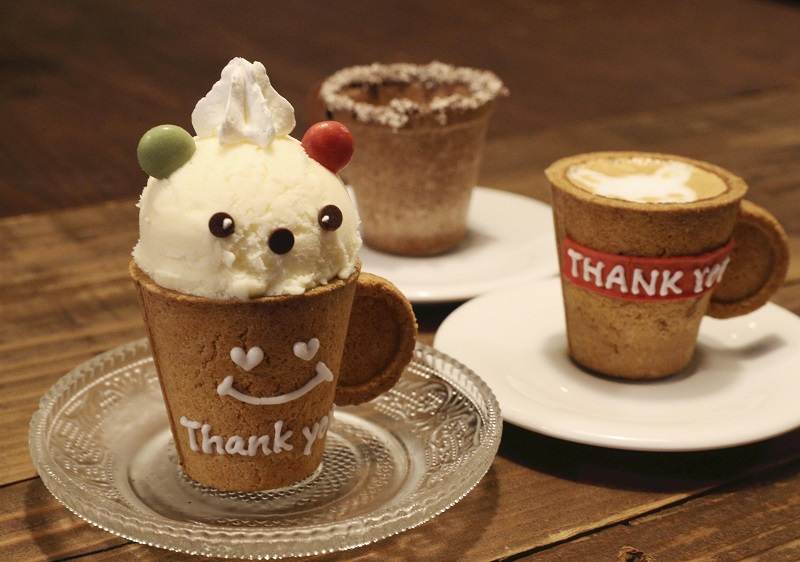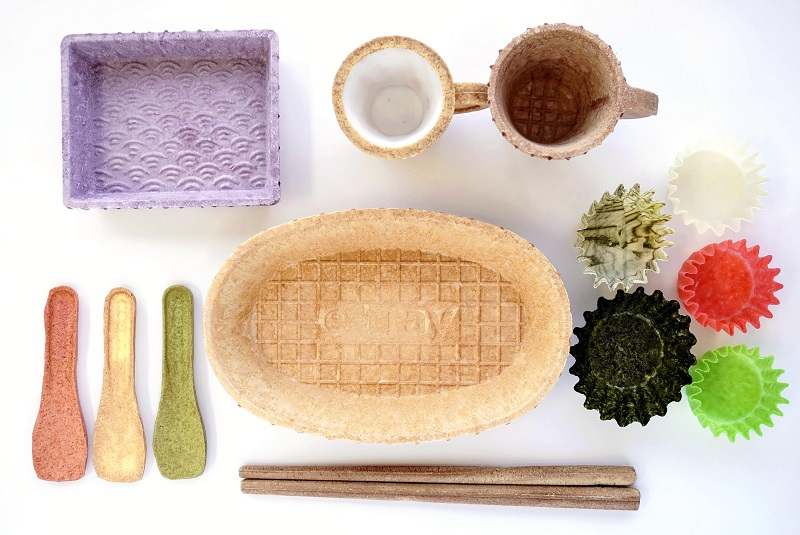
Ecopresso edible cups
17:21 JST, May 4, 2021
OSAKA — While disposable tableware is everywhere around us — chopsticks, spoons, straws, cups, plates and so on — edible tableware pieces have been growing in number of late.
Wouldn’t it be nice if such items became the norm? Amid this eco-friendly trend, several manufacturers of these products explained why they decided to produce them.
Coffee cups made of cookies
R.J. Cafe in Osaka serves edible cups in two types: one made of cookie dough and the other gluten-free.
It was in 2012 that Machiko Hayashi and her husband started the espresso-specialist cafe, which is operated by 10sense Co. — a company where Hayashi is the president.
At first, the cafe struggled financially because many customers were not familiar with the rich aroma and taste of the espresso served at the cafe. They would make complaints such as, “It’s bitter” or “The serving size is too small.”
One day, the cafe took part in an environment-themed event, at which reusable tableware was used. But Hayashi became concerned because the organizers were using a lot of water and detergent to clean the tableware.
Then she hit on the idea of pouring espresso into a cookie cup — the reverse of the popular way of eating sweets with espresso, which is dipping it into the beverage. She used pudding molds to create cups made of cookie dough, coating the inside with sugar to make it more durable. The cups were named Ecopresso and went on sale in 2016. They became popular after customers began posting photos of them on social media.
The edible cups were initially all handmade, but the company won a government subsidy and developed a machine to make them. The cups are sold to cafes in many places as well as to individual customers. They have even been used at events organized by global brands such as Mercedes-Benz and Armani.
Currently, Hayashi is planning to develop a user-friendly machine to bake the cookie cups so even children can make them at home.
“I want to spread the cups more widely so that it will become a matter of course to think about SDGs [sustainable development goals] and being eco-friendly,” she said.

Various types of edible tableware
Microwavable bento cups
Kimura Alumi Foil Co. in Osaka manufactures small cups for separating food in bento boxes. Some of the company’s bestselling products in recent years have been edible cups made of nori (dried seaweed), oboro-kombu (thinly shaven dried kelp) and soy beans. They represent the unique products offered by the company, whose motto reads, “We’ve got to do something different from others.”
The company was established in 1930 by the grandfather of the current president, Yuichi Kimura, who assumed the post in 1987.
The company used to make cups made of aluminum foil. But as microwaves and convenience stores became more and more common, aluminum liners could no longer be used for bento boxes sold at convenience stores as they are often heated in a microwave. After some trial and error, the company eventually started manufacturing cups made of plastic films.
In the meantime, society was becoming increasingly eco-friendly, which urged Kimura to think, “Wouldn’t it be great if the cups are edible and won’t become a waste?” The first food the company used to make edible cups was nori. The company started selling the seaweed-based cups in 2008 after setting up a fitting environment for food production.
As the coronavirus pandemic continues, demand for bento cups has increased because more and more people have started to use them at sushi parties at home, for example. The company is also researching the production of water-resistant edible cups that can be used for convenience store bento boxes. Another project in the works is making sheets out of unused food and turning them into cups.
Flavored trays
Marushige Seika, a company in Hekinan, Aichi Prefecture, produces wafers for “monaka ice cream,” an ice-cream-filled version of the traditional Japanese sweet monaka. In 2011, the company started selling e-trays, edible trays made with potato starch and other ingredients.
According to Katsuhiko Sakakibara, the company’s senior executive, he saw a huge number of disposable trays discarded at a gourmet event he attended more than 10 years ago. That’s when he came up with the idea of e-trays.
“The product must be solid enough to function as tableware. But it can’t be too hard because it is also food. Balancing those two factors was difficult,” Sakakibara said.
The company also gave the edible trays various flavors so people can be eco-friendly while enjoying a nice variety of options. The e-trays come in flavors such as shrimp cracker, onion, sweet potato and grilled corn.
Marushige Seika also produces edible chopsticks and “pacoon,” edible spoons made from ingredients like pumpkin and okara (soy bean pulp).
Major beverage company Asahi Breweries, Ltd. in Sumida Ward, Tokyo, has collaborated with Marushige Seika to produce edible cups called “Mogu Kappu.” They come in three sizes and have been available for purchase online since March. According to the company, it is an introduction to a new food lifestyle — moving from disposables after use to edibles after use.
Another company that has taken the eco-friendly, edible route is Bourbon Corp. in Kashiwazaki, Niigata Prefecture. It developed a tubular topping cookie called “Corone Cookie,” which can also be used as a straw. The edible straw was launched for business use last year. Currently, the company is considering commercializing the product for consumers.
It would be nice in an everyday setting to be able to enjoy your meals with some of these items and not have to worry about garbage and cleaning up.
Top Articles in Society
-

Man Infected with Measles Reportedly Dined at Restaurant in Tokyo Station
-

Man Infected with Measles May Have Come in Contact with Many People in Tokyo, Went to Store, Restaurant Around When Symptoms Emerged
-

Woman with Measles Visited Hospital in Tokyo Multiple Times Before Being Diagnosed with Disease
-

Australian Woman Dies After Mishap on Ski Lift in Nagano Prefecture
-

Foreign Snowboarder in Serious Condition After Hanging in Midair from Chairlift in Nagano Prefecture
JN ACCESS RANKING
-

Japan PM Takaichi’s Cabinet Resigns en Masse
-

Japan Institute to Use Domestic Commercial Optical Lattice Clock to Set Japan Standard Time
-

Israeli Ambassador to Japan Speaks about Japan’s Role in the Reconstruction of Gaza
-

Man Infected with Measles Reportedly Dined at Restaurant in Tokyo Station
-

Videos Plagiarized, Reposted with False Subtitles Claiming ‘Ryukyu Belongs to China’; Anti-China False Information Also Posted in Japan





















